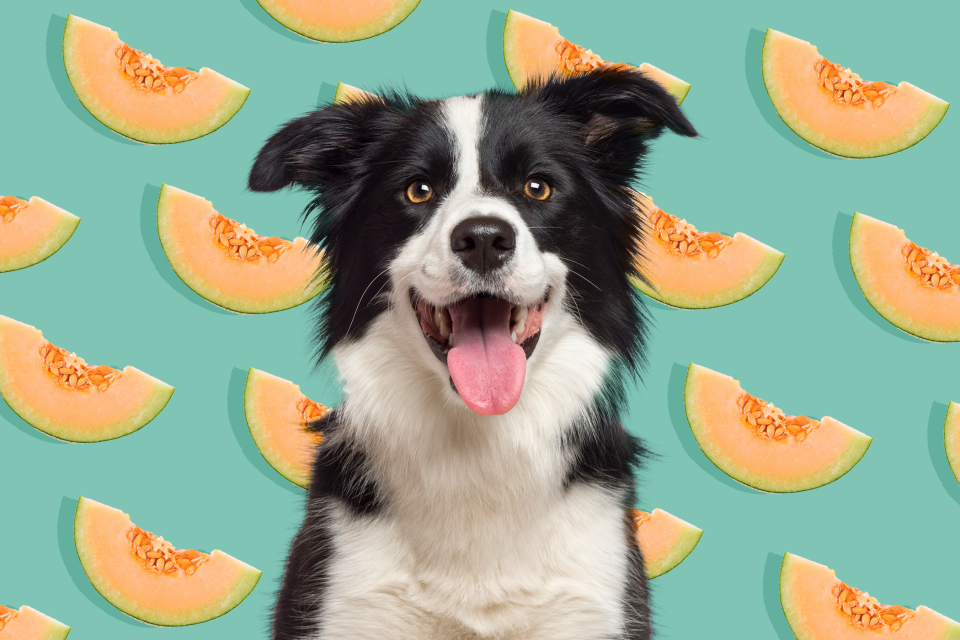Can Dogs Eat Cantaloupe?
If you enjoy healthy fruits and veggies in your own diet, it's natural to wonder if those foods are OK for the dog begging by your side at the Sunday barbecue, dining room table, or kitchen counter.
When it comes to cantaloupe, a hydrating, fiber-filled treat similar to watermelon, veterinarians say the answer is, yes, dogs can eat cantaloupe!

GlobalP / Nattawut Lakjit / EyeEm / Getty
Is Cantaloupe Good or Bad for Dogs?
The common refrain from the nation's nutrition experts for decades, "Eat your fruits and vegetables," can be just as true for dogs. While veterinary nutritionists still encourage dog parents to pick a complete and balanced diet to feed daily, they also give a thumbs-up to smart, healthy dog treats, according to board-certified veterinary nutritionist Sean Delaney, BS, DVM, MS, DACVN, whose website builds safe, complete recipes for veterinary clients.
"Fruits like cantaloupe are a rich source of dietary fiber that support gut health," Delaney says. "And they provide natural antioxidants that likely fight oxidative damage believed to be a leading cause of aging."
Cantaloupe has sugar, of course, but the melon is 90% water, so it has a fairly low glycemic index. That means there's less sugar per pound, and your veterinarian may recommend high-water fruits like cantaloupe if your dog is dealing with obesity or diabetes.
How to Give Your Dog Cantaloupe Safely
There's nothing particularly toxic about cantaloupe. It's mostly water and sugar. The big issue is the rind, according to Renee Schmid, DVM, DABVT, DABT, a veterinarian toxicologist who works with Pet Poison Helpline.
"Large amounts of cantaloupe may cause gastrointestinal upset, but it's fine to eat," Schmid says. "The rind, however, may be hard to break down and pass."
That's most likely to happen if a dog got into a bunch of discarded cantaloupe rinds in the trash, but even a small amount of rind can cause diarrhea, vomiting, or stomach upset. Ditch the rind and keep it out of your pup's reach.
Seeds, too, are indigestible and can cause stomach upset, so scoop out that middle part of the cantaloupe. (We don't usually eat that goop either.) The leaves and the vines of the cantaloupe plant, which are nontoxic, may still cause blockages or upset stomachs as well.
There's also always a small chance that cantaloupe, or any human food, won't agree with your particular dog because they eat too much of it or have a food allergy. Check with your veterinarian if a bad bout of diarrhea or vomiting doesn't resolve quickly after introducing a new food or treat to your dog's diet.
RELATED: 15 Toxic Human Foods Dogs & Cats Should Never Eat
How to Make Cantaloupe Dog Treats
If your instinct is to feed your dog raw fruit as a treat (safe ones, of course), Delaney says you're on the right track: "Feeding fruits raw and without adding sugar, added pectin, butter, or added salt is best."
The absolute easiest way to feed a dog cantaloupe as a treat is to cut it up in small pieces to avoid choking and keep portions small. If your dog loves playing with interactive toys, consider freezing those small chunks of cantaloupe and put them in a food puzzle.
Last but not least, if your dog tolerates dairy, consider mixing some frozen cantaloupe cubes with a little plain yogurt and blend it smooth in a food processor. Make sure the yogurt doesn't have the sugar substitute xylitol, which is toxic to dogs even in small amounts. Serve fresh or freeze it in small pieces for later.
"Generally, you shouldn't feed more than five or 10 percent of daily calories in treats like these," Delaney says. Cantaloupe comes in at roughly 60 calories per cup, so plan accordingly.
RELATED: How Much Food Does My Dog Really Need?
If you're ever concerned about your dog's weight or nutrition, talk to your veterinarian about your dog's overall diet. If you just like to get a little nerdy about calories, Delaney points curious cat and dog owners to the USDA's FoodData Central website, with detailed nutrition and calorie information. (Don't assume things there are OK for dogs though; the site is for us two-legged animals.)
Now, feel free to go (moderately) mad for this melon, dog moms and dads!

